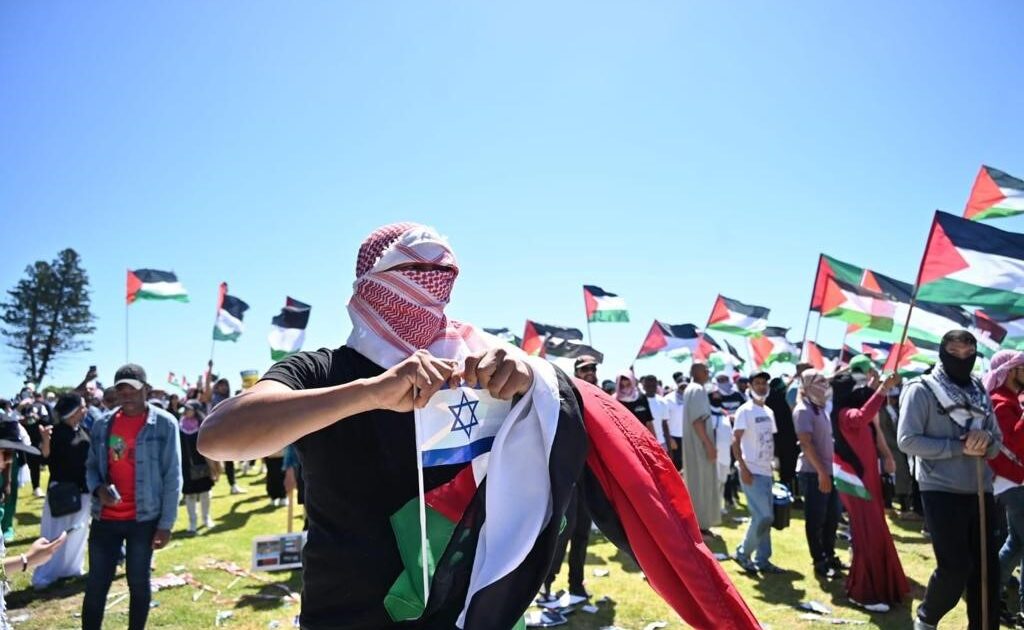Featured Item
Hate speech or free speech?

The SA Jewish Report asked Advocate Mark Oppenheimer, an expert in the boundary between hate speech and freedom of expression, to weigh in on the anti-Israel and/or antisemitic hatred in South Africa right now.
What are the legal protections for marches and expression?
The Constitution provides that everyone has the right, peacefully and unarmed, to assemble, to demonstrate, to picket, and to present petitions. Our courts have held that “free assembly is a most important right for it’s generally only organised public opinion that carries weight and it’s extremely difficult to organise if there’s no right of public assembly”.
We also have extensive free speech rights, and our courts have even held that “the fact that particular expression may be hurtful of people’s feelings, or wounding, distasteful, politically inflammatory, or downright offensive, doesn’t exclude it from protection”.
However, violent protest and genuine hate speech aren’t protected. Hate speech refers to the use of words and symbols that promote hatred against people on grounds such as race, religion, and belief, that demonstrates an intention to be harmful or incite harm against them. Jews are a protected group on the grounds of religion, and Zionists are protected based on belief.
In the Qwelane Case, the Constitutional Court held that it’s a truth, universally acknowledged, that “[t]o be hated, despised, and alone is the ultimate fear of all human beings”. Speech is powerful – it has the ability to build, promote, and nurture, but it can also denigrate, humiliate, and destroy. Hate speech is one of the most devastating modes of subverting the dignity and self-worth of human beings. This is so because hate speech marginalises and delegitimises individuals based on their membership of a group. To promote hatred is to instil detestation, enmity, ill-will, and malevolence in another.
Last week, a peaceful Christian pro-Israel vigil took place outside Parliament and was violently attacked by anti-Israel extremists. This week, a legal pro-Israel protest in Cape Town was violently brought to a halt by extremists. What does this say about freedom of speech and expression?
It shows that people’s rights to express solidarity with Israel are being trampled upon.
What should have happened to prevent this incident?
Knowing that South Africans hold different views on the current conflict, it’s important for the police to protect both sides’ ability to express their views lawfully. Waving an Israeli flag, putting up pictures of those who have been kidnapped by Hamas, and expressing condemnation for the actions of Hamas is entirely protected speech which protesters should be able to express free from violent attack.
Similarly, those who want to express solidarity with Palestinians, within the limits of the law, ought to be able to do that. However, celebrating the deaths of Jews and Israeli citizens isn’t protected speech. In Australia protesters chanted ‘Gas the Jews!’ Outside of the American embassy in Sandton, Pagad [People Against Gangsterism and Drugs] shouted, ‘One Zionist, one bullet!’; ‘Death to Israel!’; ‘Death to America!’; and ‘Death to the Saudis!’ It has also called for the war to be decentralised and brought to South Africa. Those sorts of statements amount to hate speech, and aren’t protected.
Arguably, some symbols would also not be protected. At the Sea Point marches, people carried an ISIS (Islamic State) flag. ISIS is a terror group which has beheaded journalists and killed civilians. The Hamas flag was displayed by the Palestinian Solidarity Forum at the University of Cape Town. Showing solidarity with these terror groups may amount to hate speech. In South Africa, certain public displays of the old South African flag have been viewed by our courts as hate speech. This sets a precedent which may lead to displays of the ISIS and Hamas flags being prohibited.
We must also recognise that there is some value in allowing protests on both sides of the issue so that we can assess the appetite for anti-Israel and anti-Jewish sentiment. We’ll know how much time and energy needs to be spent on educating people about the horrors of antisemitism.
What can we as the Jewish community do about the current situation?
We need to be cognisant of the scope of the problem, and recognise that there’s quite a large appetite for antisemitism and anti-Zionism in South Africa. The number of people who have been attending these rallies is large, and we should concentrate our efforts in protecting the community. We should continue to speak out against those who are hostile to Jews and Israel. Unfortunately, this includes the African National Congress and Economic Freedom Fighters (EFF), who have both come out quite clearly in favour of Hamas. The EFF has said that when it comes into power next year, it will arm Hamas. Julius Malema said that Hamas has nothing to be ashamed of. They see 7 October as an act of decolonisation. The EFF celebrated the massacre of innocent women, children, and babies.
As a community, we must use the full force of the law to take action against those who have committed hate speech or breached the Riotous Assemblies Act by inciting people to commit crimes against us. Calling for Jews to be murdered is itself a crime.
South Africa’s Jewish community is vastly diminishing. From a peak of about 120 000, there are now close to only 50 000 Jews left. But we’re a strong, vibrant community that has done an incredible job of protecting the Jewish people. We have forged bonds with Black Christians and it’s important that we continue to reach out to other communities.
There’s a parallel narrative between what’s happened to Afrikaans farmers and what’s happened to Jews. Farmers have been tortured and killed in the most brutal manner. We must denounce those attacks, and recognise that we walk a similar path to other minority communities in South Africa.
Yahya
December 10, 2023 at 10:06 pm
Criticism of Israeli genocide is NOT Andi-Semitism. If anything, Palestinians are SEMITES.